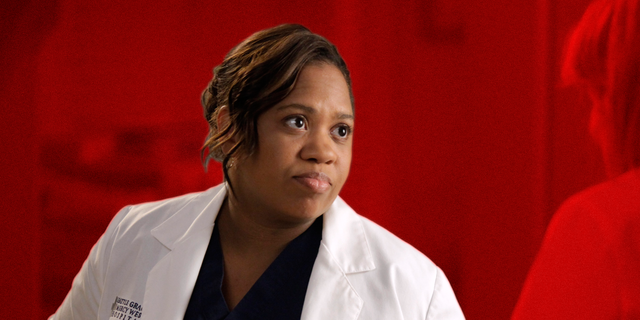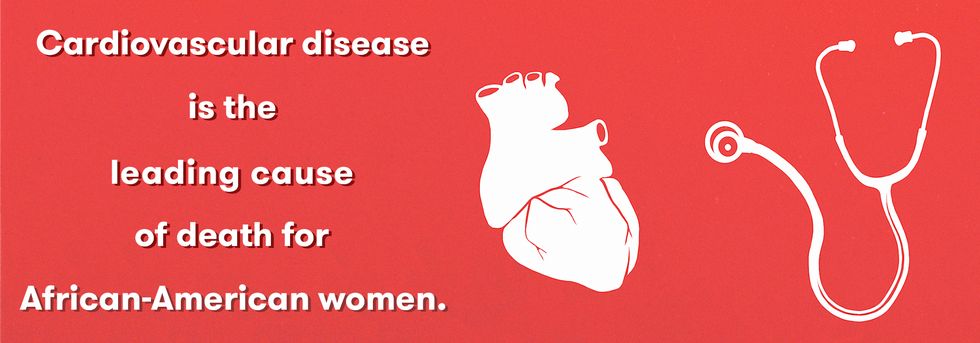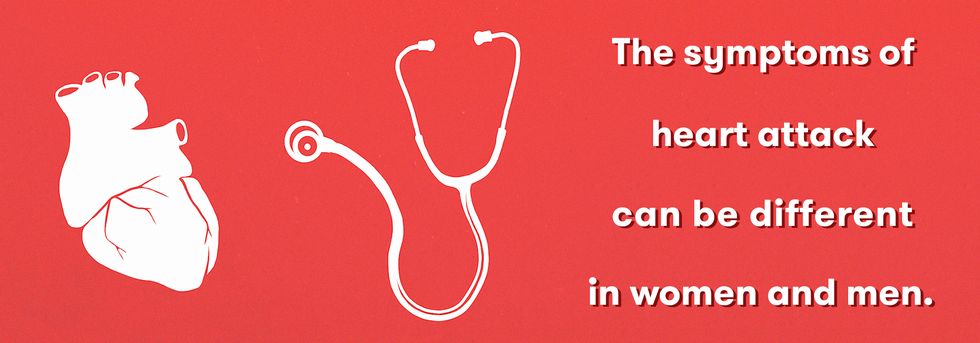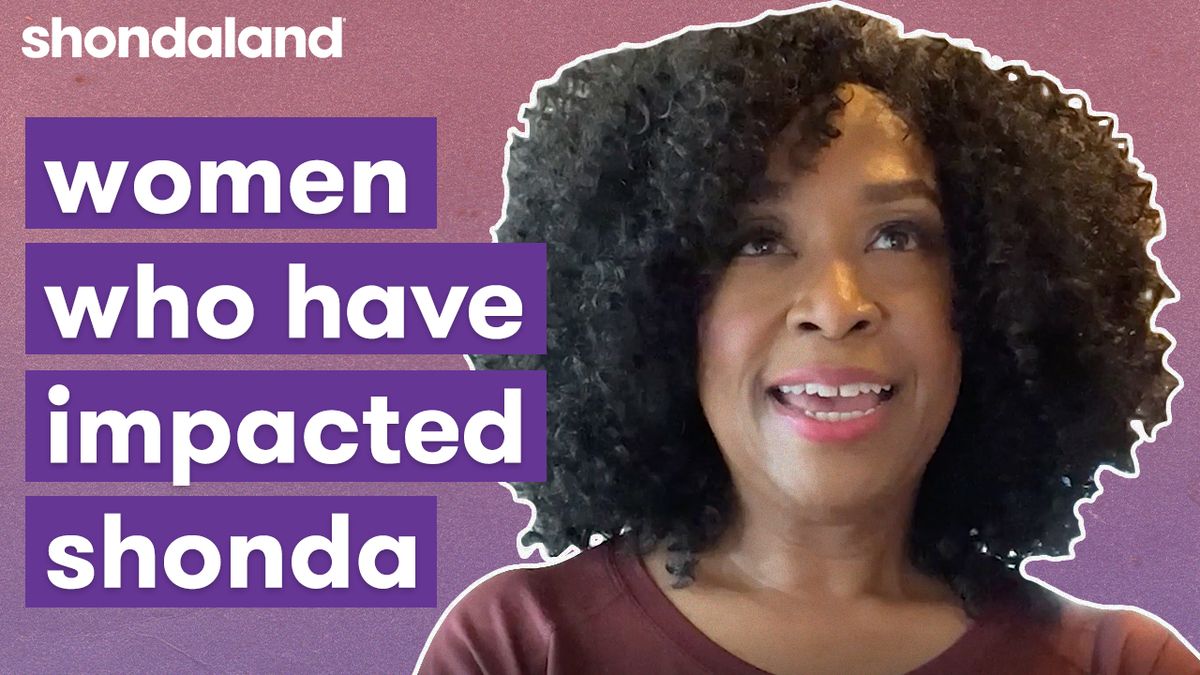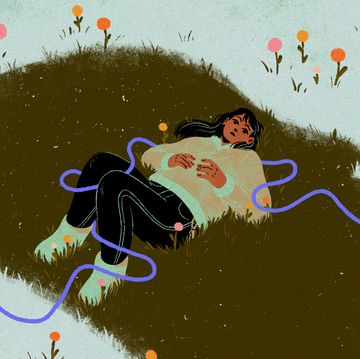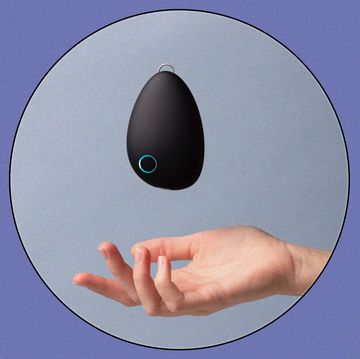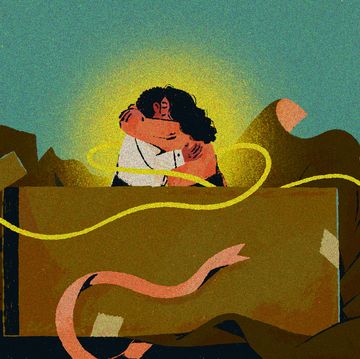Four years ago, when I began working on "Grey's Anatomy," Chandra Wilson directed my very first episode. Seventy-five percent of me was internally freaking out that THE Chandra Wilson/Dr. Miranda Bailey was directing my first episode of "Grey's Anatomy" — but the remaining 25 percent of me was nauseous and weak and tired as hell. I was several months into what felt like my millionth round of chemotherapy for a rare form of bone cancer that had plagued most of my 30s — a cancer that went misdiagnosed for several years due to a doctor who refused to believe there was something wrong, despite my protestations otherwise.
At the same time, Chandra Wilson was not only acting and directing in "Grey's Anatomy," she was also a caregiver/advocate for her daughter who struggles with Cyclic Vomiting Syndrome — a chronic disease that also went undiagnosed for quite a while.
Throughout that episode, and in the years that followed, Chandra and I swapped "war stories" about ER visits, port-a-catheters, and difficult diagnoses. There was a shorthand — a knowledge of how hard it can often be, as women in particular, to be seen and heard when managing chronic illness.
When showrunner Krista Vernoff pitched the idea of Dr. Bailey having a heart attack this season, I was lucky enough to get to write that episode with some amazing help from my fellow "Grey's" writers. I was lucky enough to have the opportunity to shine a light on how insidious and deadly — and frequently misdiagnosed — heart disease and heart attacks are in women, especially women of color.
And I was even luckier to sit down with Chandra Wilson after we shot the episode to discuss our personal experiences — and how crucial it is for people (women especially) to listen to their bodies and advocate, advocate, advocate for their own health care.
Elisabeth Finch: What was your reaction when we told you that Dr. Bailey was going to have a heart attack?
Chandra Wilson: I was excited. I was with you 100 percent when you were talking about how we would use Bailey's past, how we would use flashbacks. The information that we would be getting out there about women and heart disease, and how it differentiates itself from men. And coupled with the fact that she was mad at Ben, and that she was going to do this journey on her own, and that the words were going to come out without me having fallen on the floor, gripping onto my chest, which is what you usually think about a heart attack. All of that I thought was just great stuff for an actor to get to do.
EF: I remember we connected about Bailey's history with mental illness and how necessary it felt to bring that up, especially when she's trying to convince people that she’s physically not well.
CW: It's something that is really important to me as an actor and someone who has that story to keep that story alive. She's got her meds now, she’s theoretically level or good for her baseline, but it's not gone. It's something that she still has to work with and be aware of. The fact that it gets to come up as a part of this story, again, that's something that I love.
EF: Right. We were able to imbue this character with this history, and also educate people about what heart disease looks like in women. I remember doing a lot of research about how many things can take a woman off-path of getting the care she needs, particularly [for] heart attacks, [because] of the presumption that it's something anxiety based, emotionally based, [or because] it doesn't look like a stereotype.
CW: One of the resonating things that Bailey says in the episode is about the instance where a woman walks into an emergency room with physical symptoms, but then she's treated based on her emotions. That’s a journey in health care. How do you advocate for yourself, especially when you're in pain? There are countless people that deal with that, and you and I have talked about that in our own health care journeys — your own personal one, mine with my daughter.
EF: I have experience being a patient, but you have a particular experience being a caretaker for someone as they’ve navigated diagnosis to day-to-day and emergency care.
CW: My daughter [Sarina] is a chronic Cyclic Vomiting Syndrome sufferer, so she deals with very, very strong bouts of abdominal pain and nausea. They’re constant and all-encompassing, and the last thing you can really do in that state is be a good advocate for yourself. We have always had a system where either she calls me so I'm with her to go into emergency rooms, or we put together a brochure of her health story so that she can pass that over to whatever physician she's working with. They can see the history, they can take it seriously from the beginning.
EF: You have that, I have the big red binder.
CW: I brought it down to a brochure because a binder is really heavy. [laughs] And that, again, is the fine line that my role [as a caretaker] has to walk. You can't know too much because if you know more than what the doctor knows, then they're like, "Oh, OK. I don't know what you all are doing." So you have to scale back and let them make the discoveries and do things by asking questions, as opposed to making statements. I play a doctor on TV, I’m not [a real] one. So I always have to be asking for help. I can show the protocol, I can show what works, but it's always going to be, "What do you think?"
EF: It's like a constant dance of, "I want to advocate for myself, but I also don't want to come off as too insistent."
CW: It can be exhausting. So for [Bailey] to be in this new position experiencing this, I'm excited to see how that informs her care going forward. I love that she gets to be on that end of things. She probably wouldn't have to go through it if she had just gone on to her own hospital.
EF: Can we talk a little bit about that? Because the fact that Bailey does go to a different hospital was not an accident.
CW: No, it was her hiding.
EF: There’s such an impetus for women to hide their illness.
CW: It was a choice. It was a deliberate choice to go somewhere else. Typical Bailey to truly believe that she's having a heart attack [and] that she can just show up and have it taken care of right quick so she can go back to work [laughs]. That makes no sense at all. But it's more important for her to preserve her image [at Grey Sloan], to not have to share what's going on with Ben. She can compartmentalize. But she knows she's stressed out, she knows that the ceiling just collapsed, the sprinklers went off, there’s all this damage, and then she did this redo and painted everything, and Harper dies...
EF: And the hospital got hacked. It's not been an easy couple of months for Bailey.
CW: There's a lot, and anybody would like to take a break. And she's not somebody that's going to acquiesce to taking a break.
EF: I remember having this conversation with Krista [Vernoff] and the writers about Bailey's perception that this was just going to be something that she could deal with right quick and then return. I started talking about my first episode on the show, [the] one that you directed. I looked back at that and I was in the middle of chemo. I was bald as a ping pong ball, I was nauseous and ill, and I was miserable. But that was in one pocket over here, and then there was a job to do.
It's not just a woman thing, but we've seen it [with] a lot of females who are denying their need to take care of themselves. [Bailey’s storyline] just felt very human. [The writers] all laughed and said how ridiculous I was, and I said, "Yeah, I was ridiculous, but it also was true." It felt like it was an interesting thing to see Bailey acknowledge that that was her fear, of being viewed as less than, or weak, or unable to do her job.
CW: I think in those moments, you do feel like you're taking care of yourself, because you're taking care of it all, right? It's like, the health thing doesn't have to overtake everything else. So I can do the health, and I can do the work, and I can do the "be mad at Ben," and I can do the "being a really good mom." They all have certain times of day. It's like, "I'm going to do this from 7:00 to 2:00." [laughs]
EF: I'll be a sick person on my lunch break when no one's asking for my time.
CW: Exactly. But then life comes in, and that's when you realize, "Oh, OK, maybe I don't get to be five different people today." Maybe I have to be this one person and take care of this one thing today, and tomorrow I have to be this other person and just do that one thing. And it's hard. It's very hard to do that when you're used to juggling many balls at the same time and seemingly doing it successfully.
EF: When we were looking at what to do for Bailey, we knew she was going to go through some health crisis. What seemed right was this heart attack [because] a lot of people dismiss it, particularly women, because it doesn't look like that stereotypical "boom, floor drop." Heart attacks — in particular for women — are something that really do come out of nowhere, and we so infrequently listen to that voice in our head or that feeling in our gut.
CW: We have to give Bailey some credit, because she didn't let it go on too long. She said somewhere in the back of her brain she knew that she needed to acknowledge what was going on, even if she wasn't gonna tell anybody else about it. Things were happening early enough to where, in her lovely little organized mind, it’s saying, "If I do something now, then that's preventive and it doesn't have to get to be this other thing." Now she just needed some physicians to get on board with that program, and they weren't hearing it. I’m glad she did listen to her instincts.
EF: And didn't let the people who were telling her otherwise [lead her away] from that voice in her head or that feeling in her gut. We watch Bailey go through something and everyone is throwing doubt on her, and at times I think an audience member will wonder, "Do these doctors have a point? Is she going through something that's more emotional than physical because we're not seeing evidence?" But Bailey doesn't doubt herself.
CW: And then, of course, instead of just getting up and leaving, which she was told she couldn't do, she brings her team to her.
EF: [It’s] that intelligence of realizing, "I have fought as much as I possibly could fight and they are not listening, and now my solution is to either go elsewhere or to bring in the people that I know will hear me." It shouldn't be your job to know what your entire diagnosis is and to know how to take care of yourself, but I think you can tell when you're being heard and listened to.
If Dr. Bailey could be in charge of all the doctors in the world and give the doctor seminar speechy-speech — the Bailey arias, as we like to call them — about what they could do better in terms of listening to their patients, [what would she say]?
CW: Let's not forget that Bailey is a surgeon. Surgeons are a certain type of people that I really didn't understand until I first started "Grey’s." A lot of times people never even meet their surgeon, or don't know their surgeon, and I would think, "Oh, that's so rude. Why wouldn't you come and talk to the person and try to reassure them as best as you can?" But I realized that once you open us up, boy, everything just looks exactly the same. And the last thing that you want in your mental Rolodex while you're working on this liver or this heart is, "This person is so disgusting," or "They spoke so terribly to their wife." The only thing you want to focus on is, "How do I fix this thing?" And as the patient, that's all you really care about too. "Did you fix me? Am I OK? Can I go and have the rest of my life?" So there was a different kind of respect that I had.
But on the patient end of it, you do want to know that this person is going to do their best. I think what patients are looking for when they come in is to feel heard, where you say, "OK, I hear what you're saying. I’m glad you're here, and let's see what we can do."
EF: Well, I'm certainly glad you're here and we got to do this for Dr. Bailey. To be able to tell this story and try and help other people with you as a partner was pretty much the freaking dream.
CW: Ultimately it's the storytelling, but somebody out there will relate and say, "Oh my gosh, that's me," or "That's my so and so." Or a doctor who’ll say, "I could do that better."
To learn more about Cyclic Vomiting Syndrome and mitochondrial disease: www.cvsaonline.org and www.mitoaction.org.
This interview has been edited and condensed.
Elisabeth R. Finch is a television writer, playwright, and essayist. She is currently writer/co-executive producer on "Grey's Anatomy." Her past television credits include "True Blood" and "The Vampire Diaries."
